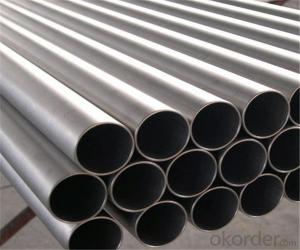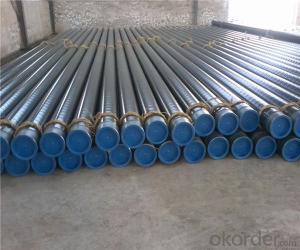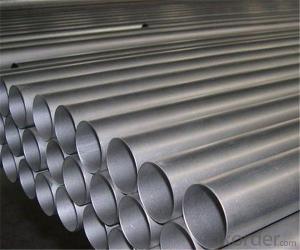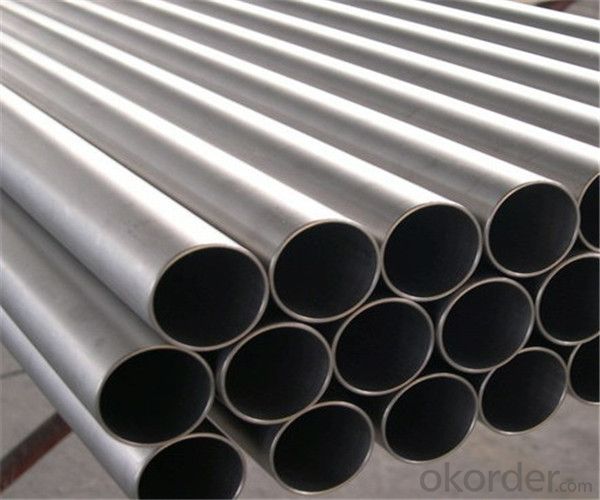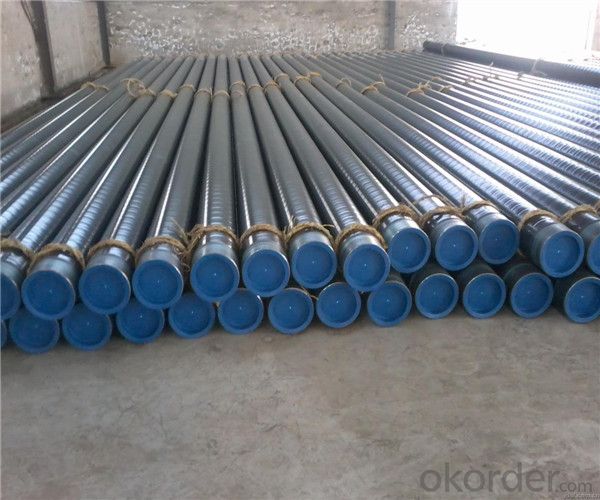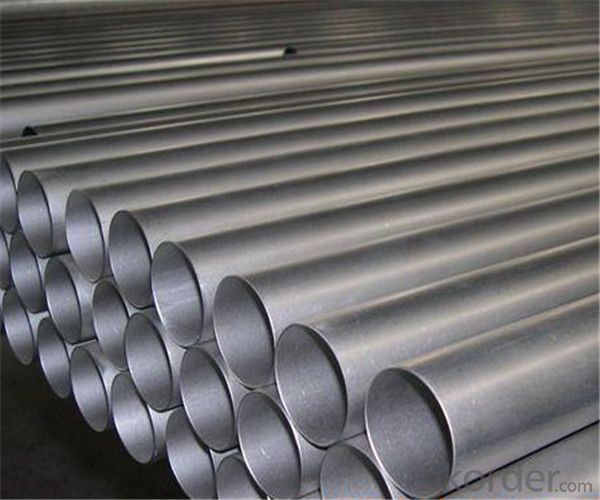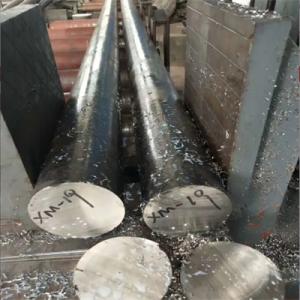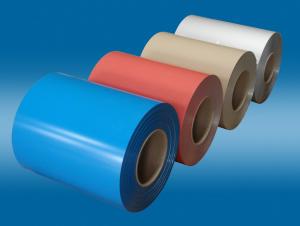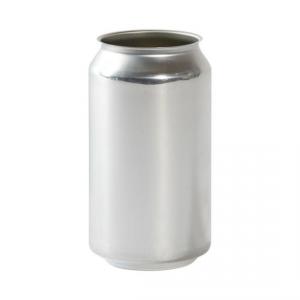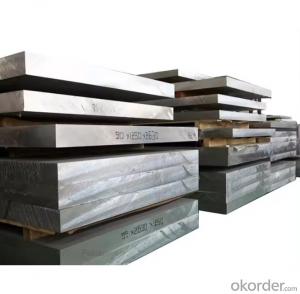Reasonable Price SSAW Spiral Welded Steel Pipes with High Quality from CNBM
- Loading Port:
- Tianjin
- Payment Terms:
- TT OR LC
- Min Order Qty:
- 200 m.t.
- Supply Capability:
- 3000000 m.t./month
OKorder Service Pledge
OKorder Financial Service
You Might Also Like
PRODUCT DETAILS
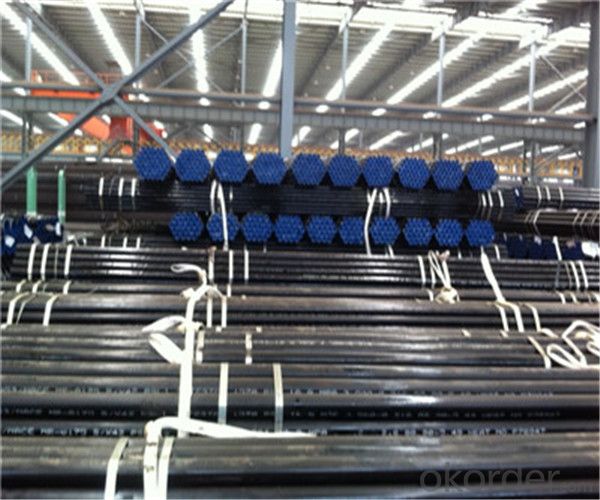
1.Structure of Seamless Steel Pipe Description:
A large amount of Seamless Steel Pipes is offered to the clients at cost effective rates. These pipes are extremely durable, resistant to corrosion and have high tensile strength. Our pipes are used in nuclear plants, power plants, refineries and construction industry across the country. Furthermore, we are capable of providing these seamless pipes to the clients in bulk quantity.
2.Main Features of the Steel Pipe:
• High manufacturing accuracy
• High strength
• Small inertia resistance
• Strong heat dissipation ability
• Good visual effect
•Reasonable price
4.Seamless Steel Pipe Specification:
| Standard: | GB, DIN, ASTM,ASME, ASTM A106-2006, ASTM A53-2007 |
| Grade: | 10#,20#, 45#, 16Mn |
Thickness: | 8 - 33 mm |
| Section Shape: | Round |
| Outer Diameter: | 133 - 219 mm |
| Place of Origin: | Shandong, China (Mainland) |
| Secondary Or Not: | Non-secondary |
| Application: | Hydraulic Pipe |
| Technique: | Cold Drawn |
| Certification: | API |
| Surface Treatment: | factory state or painted black |
| Special Pipe: | API Pipe |
| Alloy Or Not: | Non-alloy |
| Length: | 5-12M |
| Outer Diameter: | 21.3-610mm |
5.FAQ of Seamless steel pipe:
①How is the quality of your products?
Our products are manufactured strictly according to national and internaional standard, and we take a test
on every pipe before delivered out. If you want see our quality certifications and all kinds of testing report, please just ask us for it.
Guaranteed: If products’ quality don’t accord to discription as we give or the promise before you place order, we promise 100% refund.
②How about price?
Yes, we are factory and be able to give you lowest price below market one, and we have a policy that “ for saving time and absolutely honest business attitude, we quote as lowest as possible for any customer, and discount can be given according to quantity”,if you like bargain and factory price is not low enough as you think, just don’t waste your time.Please trust the quotation we would give you, it is professional one.
③Why should you chose us?
Chose happens because of quality, then price, We can give you both.Additionally, we can also offer professional products inquiry, products knowledge train(for agents), smooth goods delivery, exellent customer solution proposals.Our service formula: good quality+good price+good service=customer’s trust.
SGS test is available, customer inspection before shipping is welcome, third party inspection is no problem.
Any question, pls feel free to contact us !
- Q:Are steel pipes suitable for high-temperature applications?
- Yes, steel pipes are suitable for high-temperature applications. Steel has excellent thermal conductivity and can withstand high temperatures without losing its structural integrity. Additionally, steel pipes have high tensile strength and can resist thermal expansion and contraction, making them ideal for transporting hot liquids or gases in industrial processes.
- Q:What's the difference between straight steel pipe and seamless steel pipe?
- Seamless steel pipe and welded pipe are separated because of different production process. Seamless steel tubes include hot rolling, cold rolling, cold drawing, and other rare, such as cold extrusion.
- Q:Are steel pipes suitable for high-pressure applications?
- Yes, steel pipes are highly suitable for high-pressure applications. Steel is known for its strength and durability, making it an ideal material for carrying fluids or gases under high pressure. Steel pipes have the ability to withstand extreme conditions and maintain their structural integrity, making them a reliable choice for various industries such as oil and gas, chemical processing, and power generation.
- Q:How do you prevent steel pipes from rusting?
- Various measures can be taken to prevent the rusting of steel pipes. One effective method is the application of a protective coating on the surface of the pipes. Different types of coatings, such as paint, epoxy, or zinc, can be used for this purpose. These coatings act as a barrier between the steel and the corrosive environment, thereby preventing direct contact between moisture, oxygen, and the metal, which can lead to rust formation. Another approach involves the use of corrosion inhibitors. These substances are added to the water or fluid flowing through the pipes, creating a protective film on the surface of the steel. This film acts as a shield, inhibiting the corrosion process and preventing the formation of rust. Regular maintenance plays a crucial role in preventing rust on steel pipes. It is essential to inspect the pipes regularly for any signs of damage or corrosion and promptly repair or replace any compromised areas. Additionally, keeping the pipes clean and dry by removing accumulated dirt or moisture helps prevent the formation of rust. In some cases, using stainless steel pipes instead of regular steel can be beneficial. Stainless steel contains chromium, which forms a passive oxide layer on the metal's surface. This layer acts as a natural barrier against corrosion, making stainless steel pipes highly resistant to rust. Finally, controlling the installation environment of the pipes can also help prevent rust. This can be achieved by maintaining proper ventilation, controlling humidity levels, and avoiding exposure to harsh chemicals or corrosive substances. By implementing these preventive measures, the lifespan and integrity of steel pipes can be significantly extended, while minimizing the risk of rust formation.
- Q:Can steel pipes be used for compressed air systems?
- Yes, steel pipes can be used for compressed air systems. Steel pipes are commonly used for their strength and durability, making them suitable for handling the high pressures involved in compressed air systems. However, it is important to ensure that the steel pipes are specifically designed and rated for compressed air applications to ensure safety and prevent any potential leaks or failures.
- Q:Can steel pipes be used for oil and gas well production?
- Yes, steel pipes are commonly used for oil and gas well production due to their high strength, durability, and resistance to corrosion.
- Q:What are the different methods of pipe cutting for steel pipes?
- There exists a variety of techniques for cutting steel pipes, each tailored to specific circumstances and demands. Some of the most prevalent techniques are as follows: 1. Manual Pipe Cutters: These handheld tools are frequently employed for cutting smaller steel pipes. They typically feature a rotating cutting wheel that gradually creates a groove until the pipe is severed. Portable and relatively user-friendly, manual pipe cutters are suitable for on-site cutting tasks. 2. Hacksaw: The use of a hacksaw is a traditional and cost-effective means of cutting steel pipes. This method requires physical exertion and time; however, it can effectively cut pipes with smaller diameters. It is crucial to use a fine-toothed blade and apply steady pressure to ensure a clean and precise cut. 3. Reciprocating Saw: Also known as a sawzall, the reciprocating saw is a power tool that employs a back-and-forth cutting motion to swiftly and efficiently cut through steel pipes. These versatile saws can accommodate different types of blades to handle various pipe sizes and thicknesses. 4. Band Saw: Band saws are commonly employed in industrial settings for the purpose of cutting large steel pipes. These saws feature a continuous loop of teethed metal blade that moves on wheels, enabling precise and rapid cutting. Band saws are ideal for cutting large-diameter pipes and can be operated manually or fully automated for high-volume cutting tasks. 5. Pipe Cutting Machines: Pipe cutting machines are often utilized to achieve precise and consistent cuts. These machines are designed to cut steel pipes swiftly and accurately, making them suitable for large-scale industrial applications. Depending on the machine and requirements, various cutting methods like abrasive cutting, flame cutting, or plasma cutting can be employed. It is important to note that the selection of a pipe cutting method depends on factors such as pipe diameter, thickness, location, precision requirements, and available resources. It is imperative to adhere to proper safety precautions when working with any cutting method to prevent injury or damage to the pipes.
- Q:How are steel pipes used in the construction of underground parking garages?
- Steel pipes are used in the construction of underground parking garages for various purposes, including providing structural support, serving as conduits for utilities such as water and electricity, and facilitating drainage systems. They are often used as deep foundation elements to support the weight of the structure and the vehicles above. Additionally, steel pipes are commonly used for installing fire suppression systems, ventilation systems, and plumbing connections within the parking garage.
- Q:What are the different methods of threading steel pipes?
- There are several methods of threading steel pipes, including manual threading, machine threading, and dielectric threading. Manual threading involves using a manual pipe threader or a handheld die to create the threads on the pipe. Machine threading, on the other hand, utilizes power-driven machines that can thread multiple pipes simultaneously, increasing efficiency and accuracy. Dielectric threading is a specialized method that uses a high-frequency electrical current to generate threads on the pipe, which is commonly used for stainless steel pipes.
- Q:What are the safety precautions when working with steel pipes?
- When working with steel pipes, it is important to follow certain safety precautions to prevent accidents and injuries. Some key safety measures include wearing appropriate personal protective equipment (PPE) such as gloves, safety goggles, and steel-toed boots to protect against cuts, burns, and impacts. Additionally, workers should be trained on proper handling and lifting techniques to avoid strains and sprains. It is crucial to inspect the pipes for any defects or damage before use and ensure they are properly secured to prevent them from falling or rolling. Finally, maintaining a clean and organized work area, using caution signs, and following proper procedures for cutting, welding, and handling flammable materials are essential for a safe working environment.
1. Manufacturer Overview |
|
|---|---|
| Location | |
| Year Established | |
| Annual Output Value | |
| Main Markets | |
| Company Certifications | |
2. Manufacturer Certificates |
|
|---|---|
| a) Certification Name | |
| Range | |
| Reference | |
| Validity Period | |
3. Manufacturer Capability |
|
|---|---|
| a)Trade Capacity | |
| Nearest Port | |
| Export Percentage | |
| No.of Employees in Trade Department | |
| Language Spoken: | |
| b)Factory Information | |
| Factory Size: | |
| No. of Production Lines | |
| Contract Manufacturing | |
| Product Price Range | |
Send your message to us
Reasonable Price SSAW Spiral Welded Steel Pipes with High Quality from CNBM
- Loading Port:
- Tianjin
- Payment Terms:
- TT OR LC
- Min Order Qty:
- 200 m.t.
- Supply Capability:
- 3000000 m.t./month
OKorder Service Pledge
OKorder Financial Service
Similar products
New products
Hot products
Hot Searches
Related keywords
